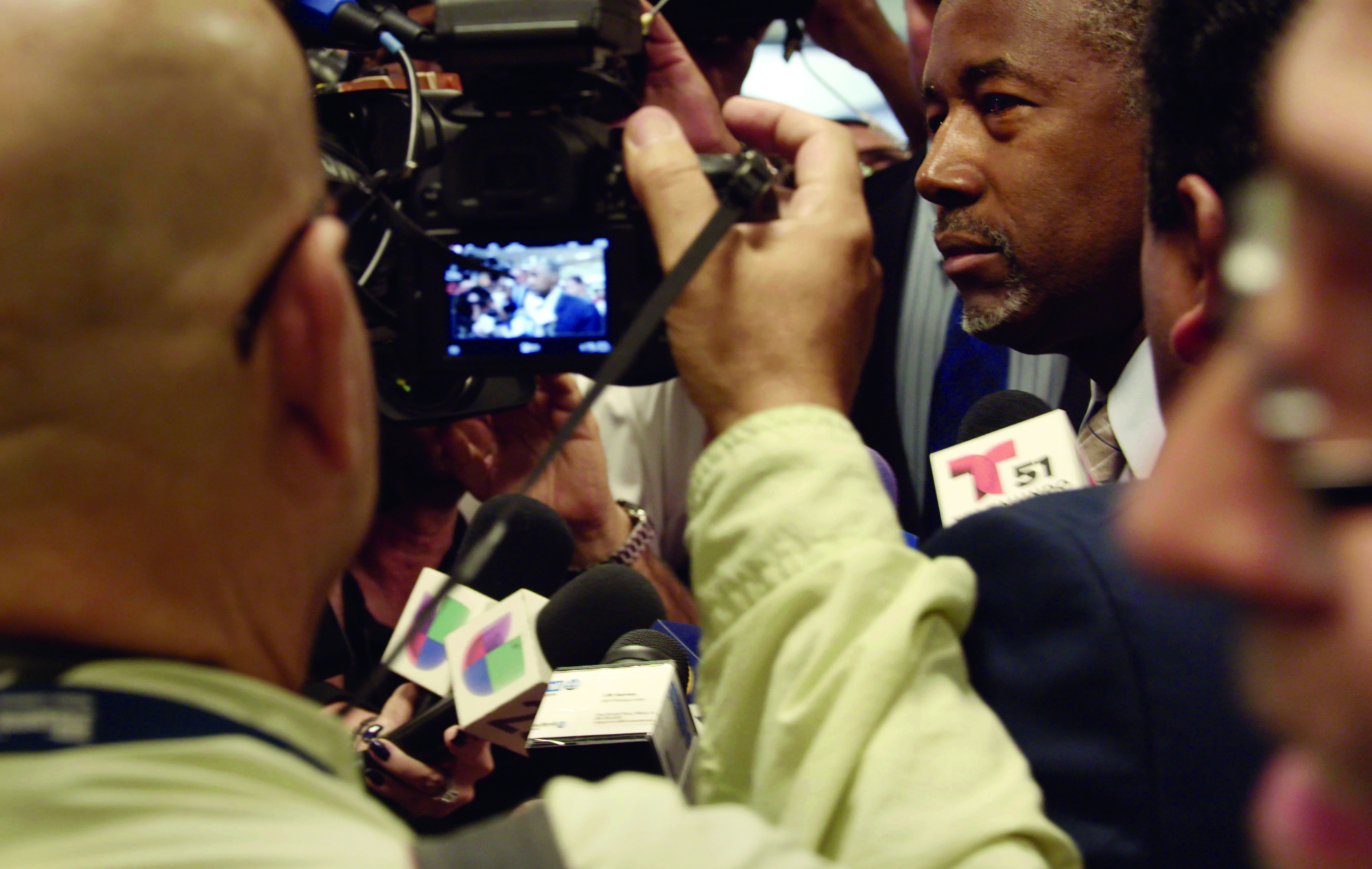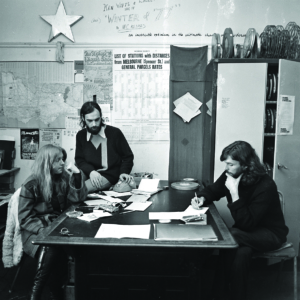During the 2016 American presidential race, Ben Carson was the no-name underdog who looked, for the briefest of moments, as though he was going to surprise everyone and come out on top – until it all came tumbling down. As Carson’s campaign crumbled, writer/director Luke Walker was there, documenting how the shadowy figures who had been pulling the political strings all along scrambled to find someone new to throw their weight behind.
His observational documentary, PACmen (2017), was a challenge to make: Walker watched but could not participate in what turned into a truly bizarre devolution of a campaign and a disquieting snapshot of the flaws of the American electoral system. As filmmaker, he was obliged to be a fly on the wall: ‘You can’t plant the scene,’ he tells me,
so you’ve got to pre-empt where the action’s going to be and get access […] then let it unfold without interference. And that’s actually really hard because, if you want to know what’s going on in someone’s head, you just want to ask them the questions.
As a combined result of his hands-off approach and the twists and turns of the campaign itself, what the film was actually about ended up chopping and changing across the many months of shooting. In Walker’s words, the final product can be described as
a film that explores the Super PAC system and the millionaires [who] persuaded Ben Carson to run for president – but, as Ben Carson’s campaign falls apart, what it actually becomes is a film about the rise of [Donald] Trump through the eyes of the men who backed the wrong horse.
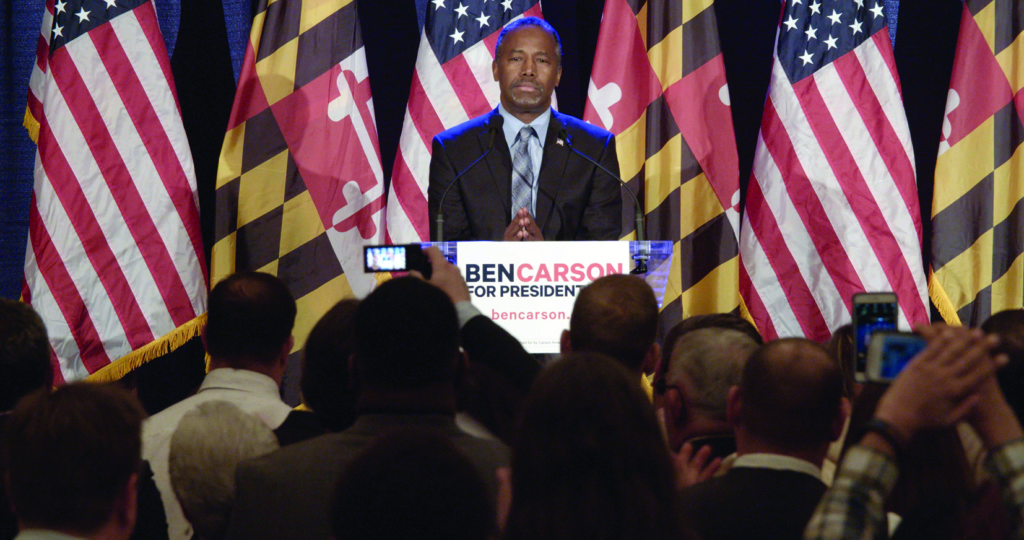
‘PAC’ stands for ‘political action committee’ and refers to a group that raises money to help promote an electoral candidate. While PACs have limitations, both on the amounts they can contribute to a campaign and on the sources they can raise money from, Super PACs face fewer restrictions – at least financially. Their expenditure has no limits and they can gather as much funding as they want from as many sources as they like, on the proviso that they work independently of the campaign. Essentially: they can spend big and harvest money widely – even from arguably ‘shady’ sources – so long as they don’t coordinate their campaign with that of the candidate or party they exist to support. ‘What you’ve got now is that anyone with a bit of money, or anyone with a narrative that can raise money, can interfere with the political process in America on a whim,’ Walker explains. ‘It’s a bizarre landscape – one that leads to bizarre candidates like Ben Carson running for president.’
Walker has a keen eye for unusual stories and quirky characters; his past projects include Beyond Our Ken (2008), a documentary about controversial Australian organisation Kenja Communication, and Lasseter’s Bones (2012), which follows a hunt for fabled lost gold in the Australian outback. In a similar vein, the US’s PAC system has traditionally flown under the radar, so the opportunity to document it in the way that eventually became available to Walker is virtually unique.
Finding himself seeking a new project, Walker had turned his attention to the US presidential race. ‘The reason I make docos is to poke my nose into things that are of interest to me,’ he says, laughing. ‘I love American politics – it’s a big fascination of mine. I read about it; CNN’s always on in my house, particularly the presidential race; it’s such a fantastic circus.’ He originally had a very straightforward project in mind: ‘It was only supposed to be a campaign film. I looked down the list of the Republican candidates,’ he recounts, ‘because I thought, “That’s where all the drama’s going to be” – and I saw the name “Ben Carson”. It was the only one I’d never heard of.’ He continues:
I started doing a bit of research into him and found [out] he’s this guy with an amazing backstory. First born into poverty, he somehow managed to get into Yale and became this incredible brain surgeon – the first guy to separate ‘Siamese’ twins joined at the head. And a black Republican, which is very unusual.
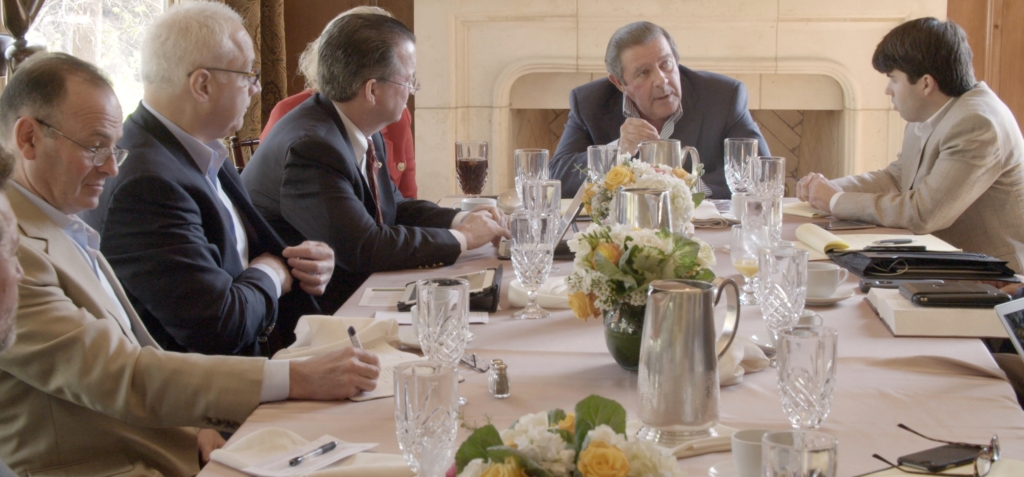
Walker contacted Carson’s campaign manager at the time, Terry Giles, not really expecting much. But he was surprised to receive a reply within a few days, asking him to fly to the US for a meeting – possibly as a test of ‘how serious [he] was’ about the project, according to Walker. The following week, he found himself in Houston ‘sitting in [Giles’] Texas mansion, drinking four bottles of fine wine […] and, by the end of it, he said, “Alright, let’s do a campaign film.”’ This strange introduction set the tone for the next few months. By the time Walker returned to the US with his cameraperson, Adrian Price, things had shifted: Giles had moved over to the Super PACs, and what was originally a project that aimed to document a campaign had turned into one exposing the usually overlooked PAC system.
Being completely committed to the observational format, Walker went with it.
Terry said, ‘Look, I’ll let you see everything. I’ll let you see me raising the money. I’ll let you see me spending the money. No-one’s ever done that before. Why don’t we do that?’ I thought, ‘Well, yep, that sounds like new ground – that sounds like something worth doing.’
Once again, however, the hands-off approach meant that the narrative was outside Walker’s control. As he turned his cameras and attention to the PAC system, the shape of events conspired against him and a new narrative began to appear between the cracks. ‘I thought the film would be about how Super PACs work, and how they’ve affected modern American politics – which it still is, to a certain extent,’ Walker explains. ‘But what I realised we had, after a couple of months, was the backstory behind why Carson was running.’
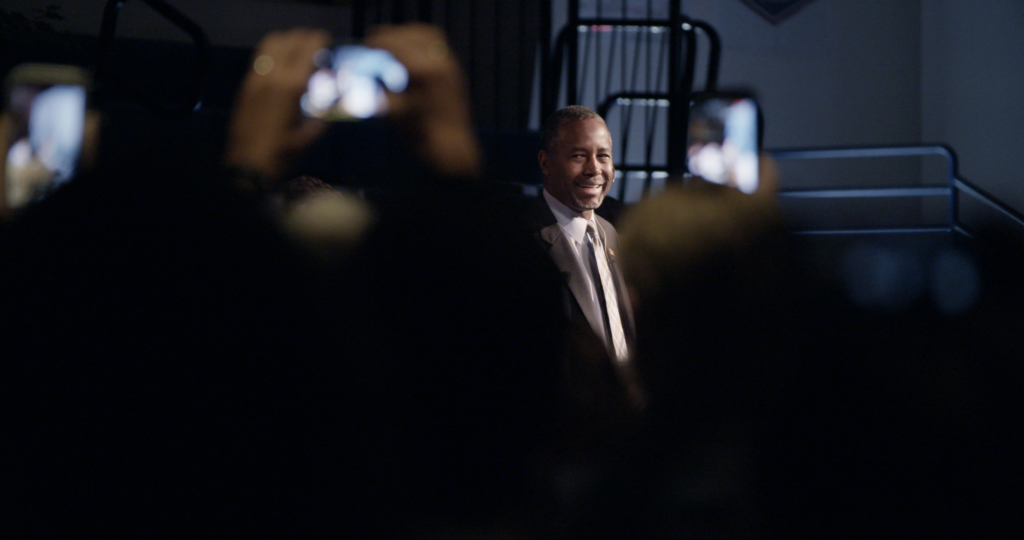
Walker had originally chosen Carson as the focus of the film because he was such an unusual and unlikely contender in the US presidential race. But, as he and his camera crew arrived on the campaign trail, things only got more surreal. Two weeks after filming commenced, Carson beat Trump for the number one Republican spot in the polls – the only person to achieve this over the course of the entire campaign. ‘I thought I was some sort of accidental documentary genius at that point because I was right in the middle of this really unexpected situation,’ Walker muses. ‘Carson had somehow got to number one and no-one understood why or how or where he’d come from – and I was right in the middle of it.’
‘I thought the film would be about how Super PACs work, and how they’ve affected modern American politics – which it still is, to a certain extent. But what I realised we had, after a couple of months, was the backstory behind why Carson was running.’
– Luke Walker
It became readily apparent that this outcome was a direct result of the PAC system – and the longer Walker stayed with the campaign, the more he realised just how instrumental the background players were in putting Carson on the map in the first place. Despite Carson’s initial success and popularity, Walker observed that ‘no-one was really sure why he was running. He didn’t seem very good at it, he didn’t seem to be enjoying it, and he didn’t seem to be properly briefed.’ Indeed, it was only in 2013 that Carson shot to political prominence, after his speech at that year’s National Prayer Breakfast, in which he was openly critical of then-president Barack Obama’s administration; prior to this, he had no known political aspirations. Walker explains that, when he was looking for a subject to document, he believed Carson’s rags-to-riches backstory might surprise people: ‘They [the group behind the PACs supporting Carson’s campaign] had seen the same thing – they’d seen a guy who could mess with the demographics.’ Walker elaborates:
If you can remember, a year-and-a-half ago, they were talking about how there might never be a Republican president ever again because of the way the demographics were shifting – and so they thought they needed someone like Ben Carson, an inspiring black Republican, to reach into that demographic that they thought they’d never be able to get near again.
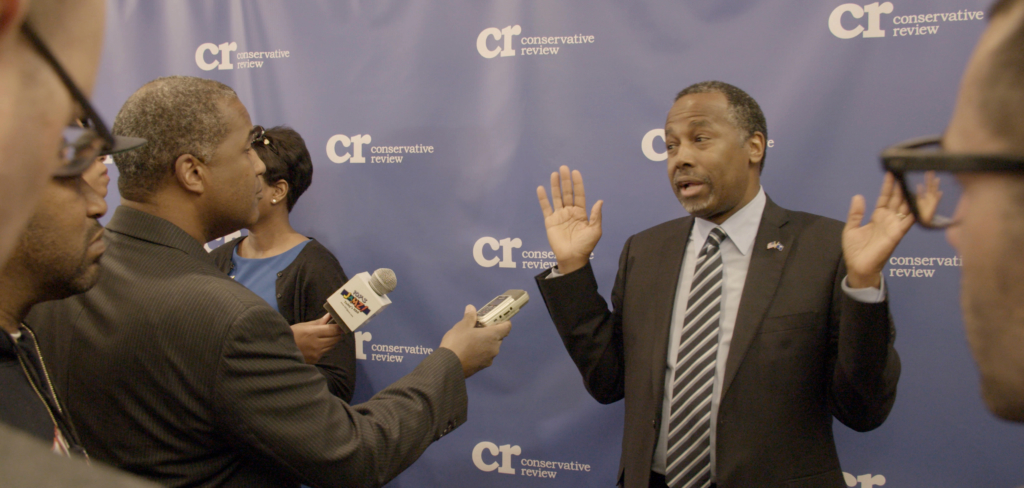
Carson was never going to run on his own steam, so the PACs began raising tens of millions of dollars just to persuade him to get in the game. The documentary shows how the PACs began running movie nights – mostly tapping into the religious, right-wing sensibilities of its target voter base – during which they would screen a Hallmark-esque film depicting Carson’s childhood and career highs. They also bombarded him with hundreds of thousands of signatures on petitions – until they finally got what they wanted.
But, just as quickly as it seemed they were on to a winner, Carson’s inexperience and original underlying reluctance to run began to force its way through. After a series of gaffes – including demonstrating a profound lack of knowledge about foreign policy, such as when he repeatedly mispronounced ‘Hamas’ as ‘hummus’,[1]Yanan Wang, ‘Ben Carson Pronounces “Hamas” like “Hummus” at Event Hosted by Republican Jewish Group’, The Washington Post, 4 December 2015, <https://www.washingtonpost.com/news/morning-mix/wp/2015/12/04/ben-carson-pronounces-hamas-like-hummus/>, accessed 13 August 2017. and asking a class of fifth-graders to point out the ‘worst student’ among them[2]Fred Barbash & Justin Wm Moyer, ‘Ben Carson’s Bumbling Humiliation of 5th-grader: Too Painful to Be Called a Gaffe’, The Washington Post, 8 January 2016, <https://www.washingtonpost.com/news/morning-mix/wp/2016/01/08/for-ben-carson-finding-worst-5th-grade-student-is-worst-campaign-moment-ever/>, accessed 13 August 2017. – he became a source of ridicule, and his popularity dropped lower and lower. Walker and Price followed the campaign for six months, watching it slowly wither and die. ‘It was pretty gruelling,’ Walker recalls; to the filmmaker, stuck in the passive role of observer, it was as though the campaign ‘just wouldn’t end – Carson wouldn’t drop out’.
The money was pretty much gone and Carson’s support had permanently stalled at below 10 per cent, but he refused to drop out. ‘It was like that for about a month. Me and Adrian […] we were desperate to come home by that point because it was over – but [Carson] wouldn’t quit,’ says Walker, the frustration still readily apparent in his voice. It was at this point that the constraints of the observational format really made themselves felt; the filmmaking team were obliged to stay with the story until the bitter end. ‘I think he genuinely thought a miracle was coming or something because nothing makes any sense as to why he was carrying on as long as he did,’ adds Walker, recalling how, every time people thought Carson was about to call it a day, he would thank everyone and tell them he’d keep on going. ‘That happened three, four or five times […] Adrian and I stood at the back of the room, watching, and would look at each other like, “We can’t go home.”’
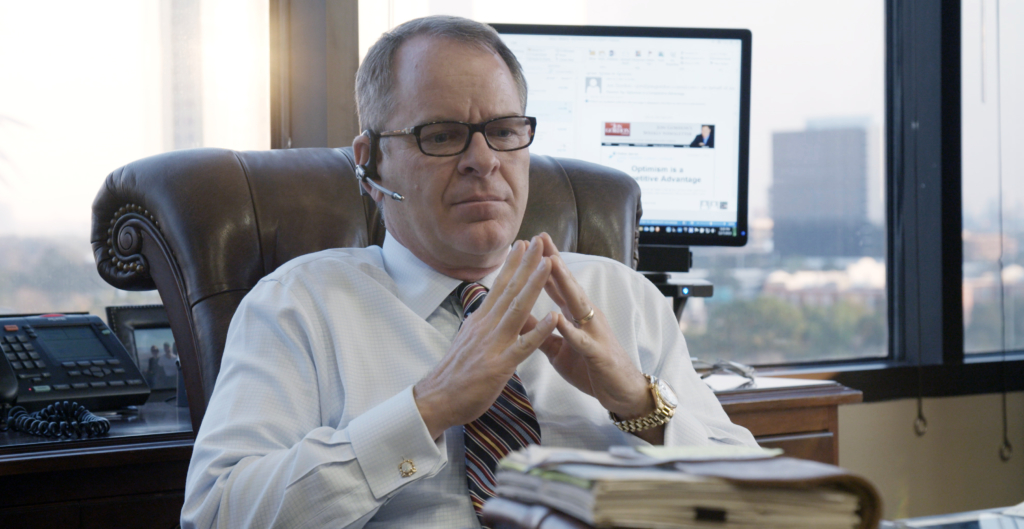
PACmen’s third act contains the documentary’s most revelatory moments. Its record of the public side of the campaign shows true believers – who have been working on the front line – growing ever more desperate, stepping up their regimen of cold-calling and trying not to let their optimism waver. Conversely, the audience sees the Super PACs, locked away in meeting rooms or over conference calls, becoming increasingly anxious to cut their losses; we watch as they make plans to shift their allegiance away from Carson’s sinking ship.
The final product is, at least superficially, a far cry from what Walker had set out to make – but it contains much greater insight into the murky realities of the US political system than audiences have previously been shown. The parameters of the filmmaking method that Walker chose to adopt mean that the documentary acts as a mirror rather than an argument. Despite the shifting narrative, the underlying motivation for what would eventually become PACmen has remained consistent throughout: ‘One of the purposes of the film, one of the challenges of the film and one of the reasons I made the film in this style was [that] I wanted both Democrats and Republicans to be able to watch it,’ Walker explains.
The Republicans could see their reflection, and maybe see things that they could’ve done better – or could do better. And I wanted Democrats to be able to watch it and at least empathise with the place of motivation that Republican actions come from. I wanted them to at least – even if they didn’t agree – be able to understand […] where [the Republicans are] coming from. To try and sort of, in some small way, create perhaps some empathy between the two sides.
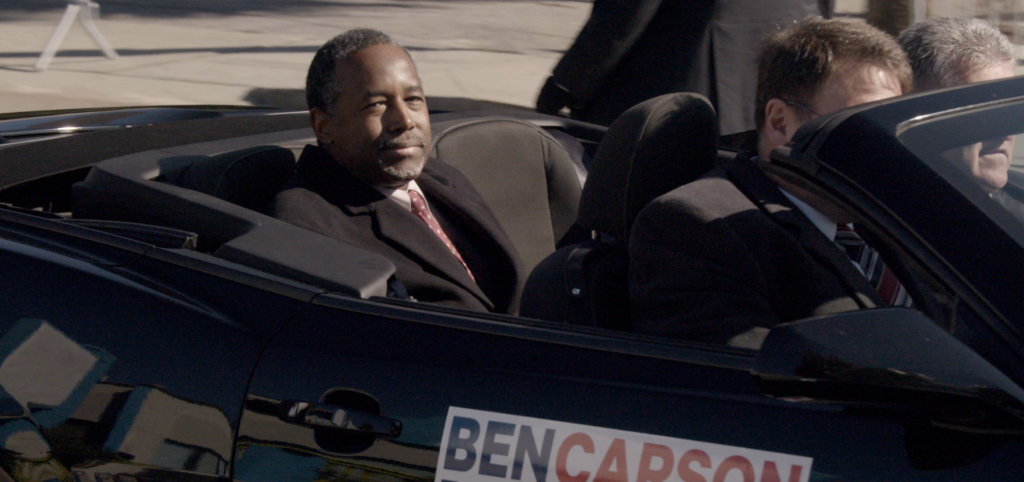
Ultimately, this isn’t a film about pointing fingers or painting heroes and villains.
If you make a film that is overtly trying to ram home a political point of view, you only preach to the converted – only one bunch of people ever watch it, and they’re the people that already agree with you. And I don’t see that there’s any point in making a film like that.
Endnotes
| 1 | Yanan Wang, ‘Ben Carson Pronounces “Hamas” like “Hummus” at Event Hosted by Republican Jewish Group’, The Washington Post, 4 December 2015, <https://www.washingtonpost.com/news/morning-mix/wp/2015/12/04/ben-carson-pronounces-hamas-like-hummus/>, accessed 13 August 2017. |
|---|---|
| 2 | Fred Barbash & Justin Wm Moyer, ‘Ben Carson’s Bumbling Humiliation of 5th-grader: Too Painful to Be Called a Gaffe’, The Washington Post, 8 January 2016, <https://www.washingtonpost.com/news/morning-mix/wp/2016/01/08/for-ben-carson-finding-worst-5th-grade-student-is-worst-campaign-moment-ever/>, accessed 13 August 2017. |
